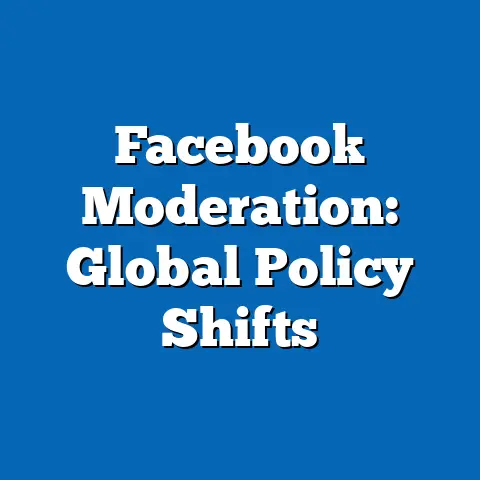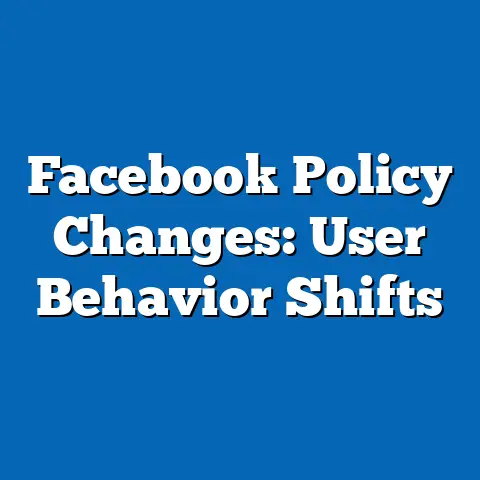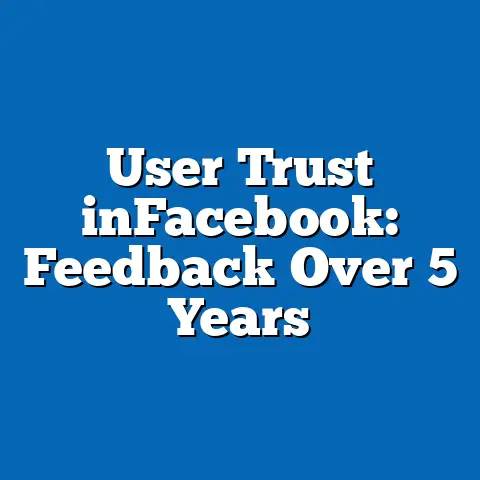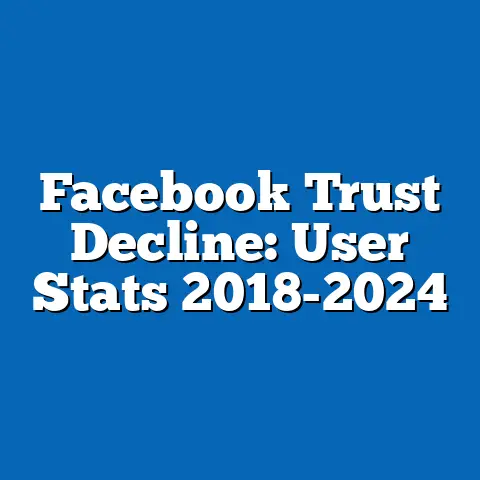Facebook User Trust Trends: Surveys
Imagine you’ve just logged into Facebook, scrolling through a mix of family updates, news articles, and targeted ads.
Suddenly, a question pops into your mind: Do you trust this platform with your personal data—your photos, messages, and browsing habits?
In an era where data breaches and privacy scandals dominate headlines, this question is more relevant than ever.
Trust in social media platforms like Facebook (now under Meta) has become a critical issue as billions of users worldwide share their lives online.
According to a 2023 Pew Research Center survey, only 27% of U.S.
adults say they trust social media companies to safeguard their personal information.
This statistic highlights a growing skepticism that has evolved over the past decade, shaped by high-profile controversies and changing user expectations.
In this comprehensive article, we’ll explore the trends in user trust toward Facebook through survey data, analyzing how perceptions have shifted over time, the demographic factors influencing trust, and the broader implications for social media platforms.
We’ll draw on data from reputable sources like Pew Research Center, Statista, and academic studies to provide a clear, evidence-based picture of where trust stands today and why it matters.
The Importance of Trust in Social Media
Trust is the cornerstone of any digital platform, especially one like Facebook, which reported 3.05 billion monthly active users globally as of Q3 2023 (Meta Investor Relations).
Users entrust the platform with sensitive data, from personal conversations to financial information used for ad purchases.
When trust erodes, it can lead to reduced engagement, loss of users, and even regulatory scrutiny.
Surveys over the past decade reveal that trust in Facebook has been tested by events like the 2018 Cambridge Analytica scandal, where data from up to 87 million users was improperly accessed for political advertising (Federal Trade Commission, 2019).
Such incidents have fueled public concern about how social media giants handle data privacy and security.
Understanding user trust trends through surveys offers a window into how these events shape perceptions and behaviors.
Historical Trends in Facebook User Trust
Early Years: High Trust and Rapid Growth (2008–2012)
In Facebook’s early years, trust was relatively high as the platform positioned itself as a safe space for connecting with friends and family.
A 2010 Pew Research Center survey found that 71% of U.S.
social media users felt confident that their personal information was secure on platforms like Facebook.
During this period, the platform’s user base grew exponentially, reaching 1 billion monthly active users by 2012 (Meta Historical Data).
The Turning Point: Privacy Concerns Emerge (2013–2017)
By the mid-2010s, trust began to waver as users and regulators started questioning Facebook’s data handling.
A 2015 survey by the Annenberg School for Communication found that 84% of U.S.
adults were concerned about third parties accessing their social media data.
This growing unease was compounded by reports of data breaches and the platform’s complex privacy settings, which many users found difficult to navigate.
During this period, Facebook’s monthly active users continued to climb, reaching 2.27 billion by Q4 2018 (Meta Investor Relations).
Yet, beneath the surface, survey data indicated a brewing distrust that would soon come to a head.
Post-Cambridge Analytica: A Sharp Decline (2018–2020)
The 2018 Cambridge Analytica scandal marked a pivotal moment for Facebook’s public image.
A 2019 Pew Research Center survey conducted in the scandal’s aftermath found that only 29% of U.S.
adults trusted social media companies to protect their data, a significant drop from the 71% reported in 2010.
Additionally, 54% of respondents believed that social media platforms like Facebook had too much control over personal information.
This decline in trust was not just anecdotal.
A 2019 Statista survey revealed that 32% of U.S.
users had reduced their time on Facebook due to privacy concerns, while 10% reported deleting their accounts entirely.
The scandal’s impact was global, with similar drops in trust reported in Europe and Asia, according to Edelman’s 2019 Trust Barometer.
Recent Years: Stabilization or Continued Skepticism? (2021–2023)
In recent years, trust in Facebook has shown signs of stabilization, though it remains low compared to the platform’s early days.
A 2023 Pew Research Center survey found that 27% of U.S.
adults trust social media companies with their data, a slight decline from 2019 but not a dramatic shift.
Meanwhile, a 2022 Statista survey indicated that 41% of global users still express concern over how Facebook uses their personal information.
Despite these numbers, Facebook’s user base has continued to grow, reaching 3.05 billion monthly active users in 2023.
This paradox—growing usage alongside persistent distrust—suggests that convenience and network effects may outweigh privacy concerns for many users.
Demographic Differences in Trust Levels
Trust in Facebook is not uniform across all user groups.
Survey data reveals significant variations based on age, gender, education, and geographic location.
Understanding these differences provides insight into who is most skeptical and why.
Age: Younger Users More Trusting, Older Users Wary
Age plays a significant role in shaping trust in social media platforms.
According to a 2023 Pew Research Center survey, 35% of U.S.
adults aged 18–29 report trusting social media companies with their data, compared to just 19% of those aged 50 and older.
Younger users, often digital natives, tend to prioritize connectivity over privacy concerns, while older users are more likely to have experienced or read about data breaches.
This generational divide is also evident in behavior.
A 2022 Statista survey found that 28% of users aged 18–24 had adjusted their privacy settings on Facebook in the past year, compared to 42% of those aged 50–64, indicating greater proactive concern among older demographics.
Gender: Slight Variations in Concern
Gender differences in trust are less pronounced but still notable.
A 2021 Pew Research Center survey found that 30% of U.S.
women trust social media companies with their data, compared to 25% of men.
Women are also slightly more likely to express concern about data privacy, with 62% citing it as a major issue compared to 58% of men (Statista, 2022).
These differences may stem from varying experiences with online harassment or targeted advertising, though more research is needed to fully explain the gender gap.
Education: Higher Education Linked to Lower Trust
Education level also correlates with trust in Facebook.
A 2023 Pew Research Center survey found that only 22% of U.S.
adults with a college degree or higher trust social media companies, compared to 32% of those with a high school diploma or less.
Higher-educated individuals are often more aware of data privacy issues and may be more critical of corporate practices.
This trend aligns with findings from a 2020 Edelman Trust Barometer, which noted that trust in technology companies, including social media, tends to decrease as education level increases, likely due to greater exposure to information about data misuse.
Geographic Location: Global Variations
Trust in Facebook varies widely by region, influenced by cultural attitudes toward privacy and local regulations.
In the European Union, where the General Data Protection Regulation (GDPR) has heightened awareness of data rights, only 18% of adults trust social media companies, according to a 2022 Eurobarometer survey.
In contrast, a 2023 Statista survey in Asia-Pacific found that 38% of users in countries like India trust platforms like Facebook, possibly due to lower regulatory scrutiny and higher reliance on social media for communication.
In the U.S., trust levels hover around 27% (Pew Research Center, 2023), reflecting a middle ground between Europe’s skepticism and Asia’s relative openness.
These geographic differences underscore the role of policy and cultural context in shaping user perceptions.
Key Events and Their Impact on Trust
Several high-profile events have shaped public trust in Facebook over the years.
Surveys conducted before and after these incidents provide quantitative evidence of their impact.
Cambridge Analytica Scandal (2018)
As previously mentioned, the Cambridge Analytica scandal was a watershed moment.
Pre-scandal surveys, such as a 2017 Pew Research Center report, showed that 41% of U.S.
adults trusted social media companies with their data.
Post-scandal, this figure dropped to 29% in 2019, a clear indicator of the event’s impact.
The scandal also triggered behavioral changes.
A 2018 Reuters/Ipsos poll found that 25% of U.S.
Facebook users planned to use the platform less, while 13% had already deleted their accounts.
Globally, the hashtag #DeleteFacebook trended, amplifying the public backlash.
Data Breaches and Security Issues (2019–2021)
Beyond Cambridge Analytica, smaller-scale data breaches have also eroded trust.
In 2019, Facebook disclosed a breach affecting 540 million user records, exposed on third-party servers (TechCrunch, 2019).
A 2020 Statista survey conducted after this incident found that 48% of U.S.
users were “very concerned” about data security on social media, up from 41% in 2018.
These breaches, while less publicized than Cambridge Analytica, contributed to a cumulative sense of unease.
They also prompted regulatory action, including a $5 billion fine from the U.S.
Federal Trade Commission in 2019—the largest ever for a privacy violation.
Misinformation and Content Moderation (2020–2023)
The spread of misinformation, particularly during the COVID-19 pandemic and the 2020 U.S.
presidential election, further damaged trust.
A 2021 Pew Research Center survey found that 59% of U.S.
adults believe social media platforms like Facebook are a major source of misinformation.
Additionally, 64% felt that these platforms do not do enough to combat false information.
Content moderation controversies, such as the temporary suspension of political accounts, have also fueled distrust among certain user groups.
A 2022 Edelman Trust Barometer report noted that 52% of global respondents distrust social media companies due to perceived bias in content policies.
Transparency and Policy Changes: Efforts to Rebuild Trust
In response to declining trust, Facebook has implemented several policy changes and transparency initiatives.
Surveys suggest mixed results on whether these efforts are resonating with users.
Privacy Tools and Settings
Since 2018, Facebook has rolled out features like the “Privacy Checkup” tool, which helps users review and adjust their data settings.
A 2020 Statista survey found that 35% of U.S.
users had used such tools, though only 22% felt they significantly improved their trust in the platform.
Additionally, the introduction of end-to-end encryption for Messenger and WhatsApp has been met with cautious optimism.
A 2022 Pew Research Center survey noted that 29% of users viewed encryption as a positive step, though many remained skeptical of broader data practices.
Transparency Reports
Facebook began publishing transparency reports detailing data requests from governments and content moderation actions.
In 2022, the platform reported removing 1.3 billion pieces of harmful content, including misinformation and hate speech (Meta Transparency Center).
However, a 2023 Edelman Trust Barometer survey found that only 26% of global users trust these reports, citing concerns about selective disclosure.
Regulatory Compliance
Compliance with regulations like GDPR in Europe and the California Consumer Privacy Act (CCPA) in the U.S.
has forced Facebook to offer more data control to users.
A 2022 Eurobarometer survey found that 31% of EU users felt more confident in social media privacy due to GDPR, though overall trust remained low at 18%.
These efforts indicate a recognition of trust issues, but survey data suggests that rebuilding user confidence is a slow process.
Many users remain unconvinced that policy changes address deeper systemic issues.
Data Visualization Description: Trust Trends Over Time
To illustrate the historical trends in trust, imagine a line graph titled “Trust in Social Media Companies (U.S.
Adults, 2010–2023)” based on Pew Research Center data.
The x-axis represents years from 2010 to 2023, and the y-axis shows the percentage of adults who trust social media companies with their data.
The line starts at 71% in 2010, reflecting high initial trust, then gradually declines to 41% by 2017.
A sharp drop occurs in 2018–2019, falling to 29% post-Cambridge Analytica, before stabilizing around 27% in 2023.
Annotations highlight key events like the 2018 scandal and the 2019 FTC fine, providing context for the declines.
This visualization would help readers grasp the long-term erosion of trust and the specific moments that accelerated it.
A second bar chart could depict demographic differences in 2023 trust levels, with bars for age groups, gender, and education, showing the variations discussed earlier.
Broader Implications and Future Trends
The survey data on Facebook user trust trends reveals a platform at a crossroads.
While user numbers continue to grow—reaching 3.05 billion monthly active users in 2023—trust remains low, with only 27% of U.S.
adults expressing confidence in social media companies (Pew Research Center, 2023).
This disconnect suggests that many users feel locked into the platform due to social or professional needs, even as they harbor reservations.
Demographic patterns indicate that trust is not a monolith.
Younger users and those in less regulated regions like Asia-Pacific are more trusting, while older, more educated, and European users remain skeptical.
These differences highlight the challenge of addressing diverse user concerns with a one-size-fits-all approach.
Looking ahead, several factors could shape trust trends.
Ongoing regulatory scrutiny, such as potential U.S.
federal privacy laws or stricter EU enforcement, may force greater transparency but could also expose further vulnerabilities.
Additionally, the rise of competing platforms like TikTok, which reported 1.5 billion monthly active users in 2023 (Statista), may pressure Facebook to innovate on privacy to retain users.
The persistence of misinformation and content moderation debates will also influence trust.
Surveys consistently show that users want platforms to balance free expression with safety, a tightrope that Facebook has yet to fully navigate.
A 2023 Edelman Trust Barometer report suggests that trust in technology overall hinges on ethical data use and accountability—areas where Facebook must demonstrate consistent progress.
Ultimately, the story of Facebook’s user trust is one of erosion followed by uneasy stabilization.
While the platform remains a dominant force in social media, its ability to rebuild trust will depend on tangible actions rather than promises.
As users become more privacy-conscious, the stakes for Meta are higher than ever.
Will Facebook adapt to these evolving expectations, or will skepticism become a permanent fixture of its user relationship?
Only time—and future surveys—will tell.






